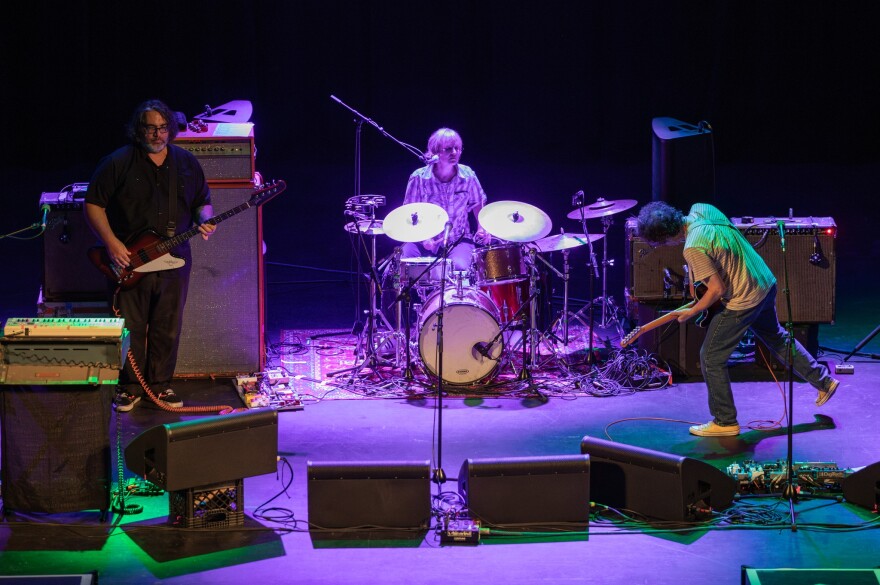Doug Martsch of Built to Spill walked on stage at the Pabst Theater last Wednesday night with a backpack slung over one shoulder, guitar in hand and a simple wave to the crowd. It was a perfectly understated start to three hours of pure excellence.
Flanked by Teresa Esguerra on drums and Melanie Radford on bass, Martsch plugged in without saying a word and opened the set with the band’s hit song, “Goin’ Against Your Mind.” The almost 9-minute track shut off all conversation in the audience and locked attention on the stage.
The recorded version of the track is a perfect introduction to anyone unfortunate enough not to know Built to Spill yet. The live version lived up to that, with a dynamic guitar structure that effortlessly bounced between peace and chaos, coupled with a consistently driving rhythm section.
As big as the Pabst Theater is, there was a palpably intimate connection between audience and band. Cries of “Dougie” and hollers from the crowd were met with simple smiles on stage — and zero banter between songs. It wasn’t a lack of personality or care, because it was obvious they felt the love from the audience. Sometimes you just get to a point with your art that you can let it speak for itself. At the Pabst Theater, Built to Spill’s music spoke emphatically.

Martsch effortlessly managed his guitar while playing complex chord progressions and solos. Watching this guy tweak his pedalboard while simultaneously playing “Distopian Dream Girl” is a testament to his 30+ years fronting the band. His always shifting method of playing and singing created an almost-spiritual air to the performance. Frankly, Martsch seemed to be in a trance, trusting Esguerra and Radford not only to keep up, but to seamlessly adapt to every improvised note without breaking a sweat.
This is a band that understands their music to its core, fundamentally redefining what Built to Spill is in the modern day. It’s not the ’90s anymore, but the group still manages to tear up the indie-rock playbook to shreds, allowing their natural inclinations toward music be the foundation for modern rock.
Then there was the night’s other foundational member of the indie community: Yo La Tengo (this show was just an embarrassment of riches for Milwaukee’s indie heads).
The trio came on stage with four different amps and a pedal steel setup, and proceeded to constantly shift instruments between each song. It was a group of veteran artists casually showing off just how good they are and demonstrating their well-earned, rock-solid relationship.
Guitarist Ira Kaplan and drummer Georgia Hubley founded the group as a couple in the ’80s, and bassist James Mcnew joined the band in 1992. In the more than three decades since, they’ve built a balancing act of noise and sweet melodies that was present in equal parts at the Pabst Theater.
They went from playing a wall-of-sound-esque ear burster like “Sugarcube” to the warmest vocal harmonies from hit song “Autumn Sweater.” Throughout the night, they showcased music that’s both singular and humble. It doesn’t take itself too seriously; it’s just honest.

A band born from young love matures throughout the decades, taking time to cement itself in new eras and understand the depth in which people change. Kaplan and Hubley have been together for a long time, and their music reflects that.
Writing that’s both hopeful and full of despair wedges between slick acoustic melodies. Garage-rock breakdowns mirror the disorder that comes from being in love and in a band. Combining the two can be emotionally draining at times, but witnessing the release of their love and art on a random Wednesday night was an emotionally provocative moment.
To close, Yo La Tengo invited Marsch back to the stage so he and Kaplan could trade guitar solos across 10 minutes before playing two tribute covers to folk legends Peter Stampfel and Michael Hurley. They turned the spotlight on artists they admire rather than showing off their own work.
It was an appropriate way — really the only way — to end the show for a group of artists with nothing to prove.


